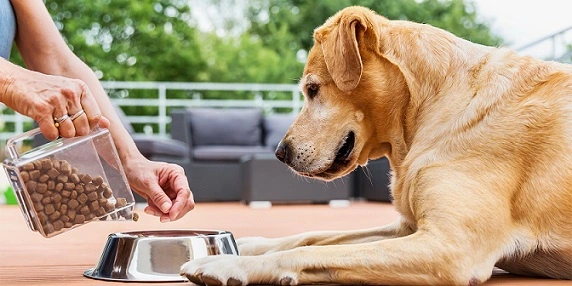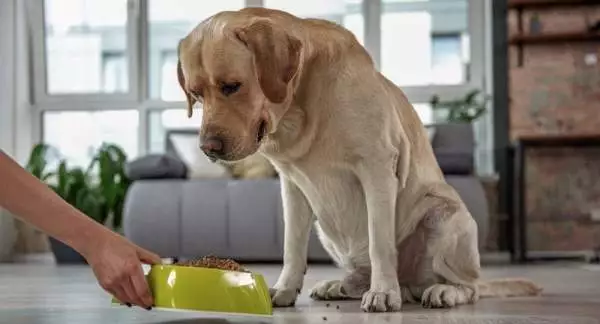It is widely established that human needs change with age, and people are advised to acquire more specific nutrients like vitamin D after age 70. However, dogs do not even have a senior legal age.

Some food packages designated for “senior dogs ” have a large “seven plus ” on the front, while others have a “six plus ” or ten plus.” The information on what to feed your aging dog might be confusing, and much of it is driven by corporate marketing.
According to Joseph J. Wakshlag, Ph.D. ’05, D.V.M. ’98, professor of clinical nutrition and sports medicine and rehabilitation, “There is no real purpose to give a senior diet to our aging dog unless there are documented concerns, such as lean body wasting, arthritis, puppy hiccups or obesity.”
There is no one-size-fits-all strategy to diet for elderly dogs because each of these problems requires a particular approach, so talk to your veterinarian about it. It might not be easy.
At What Age Should I Start Giving Senior Dog Food To My Aging Dog?
The dog’s breed and overall health will significantly impact the response to this question. Dogs gradually lose strength and health as they get older. They struggle to adjust to the pressures and changes in their environment as their bodies lose the capacity to repair themselves and maintain regular bodily processes.
Additionally, the metabolism slows down, and the dog needs fewer calories around age 7 for most dogs and age 5 for gigantic breed dogs. This is when you can give them senior dog food after consulting the vet.
Senior foods may make dogs live longer, healthier lives, but they may not be the best option for an older dog with health issues. Your older dog will benefit from a diet that primarily addresses any health issues it may have, such as kidney failure, diabetes, or poor nutrient absorption in the stomach. Your veterinarian can help you in these situations.
Routine veterinary checks and blood tests can determine the ideal diet for your older dog. Since each pet food manufacturer has a slightly different definition of “senior,” the age at which you switch to senior food will largely depend on the brand you choose.
things to Consider Food For Senior Dogs
An excellent, well-balanced diet with fewer calories, more fiber, and enough protein and fat will be necessary for the older dog. Some senior dogs can still receive their regular diet, just in lower amounts. Make sure that when your dog starts aging, you shall take care of the filling points:
Protein Is A Must:
A diet heavier in protein may be required if your canine friend is losing lean body mass, suggests Wakshlag. As dogs age, they frequently stop producing as much protein on their own, increasing the demand for it in their diet.
Protein is essential to the development and maintenance of muscles. Lean body mass loss is linked to a higher risk of disease and demise. However, a dog might have the same lean body mass, whether overweight or underweight.
The larger body size of the overweight dog may give the impression that they are healthier at first appearance, yet neither dog has any muscle mass. The dog’s thighs and shoulders are the easiest body portions to assess for muscle tone and mass.
Loss of muscle mass can be a sign of underlying illness like cancer, heart disease, or kidney disease, or it can be a regular aspect of aging.
Add Fatty Acid To Its Diet:
You can give your dog a 1,000 mg fish oil supplement tablet, which typically has about 300 mg of EPA/DHA, to ensure they are getting enough of the fats. Dr. John Loftus, an assistant professor of small animal health, says the recommended dosage is 1-2 capsules per 10 pounds of body weight.
For dogs with arthritis or other movement issues, long-chain omega-3 fatty acids like eicosapentaenoic acid (EPA) and docosahexaenoic acid (DHA) may be helpful. Still, high doses are needed to show results.
Observe The Calories Requirements:
Regularly weigh your dog and check their body health to be aware of any substantial changes. Regular weighing can be beneficial because it can be challenging to detect slow weight gain in your dog. There is no need to reduce amounts if your dog is still taking daily walks and engaging in other activities. However, if your dog is spending more time at home relaxing and beginning to put on weight, it may be time to cut back on portions or switch to a lower-calorie diet.
Start Giving Supplements Regularly:
Just like humans with aging, your dog also needs supplements. To choose the right supplement product for your senior dog, you shall conduct a detailed market survey first. The reason is that dog supplements aren’t always well-regulated.
To avoid any counterfeit products, which are more prevalent online, buy goods from your veterinarian or another reliable source.For instance, many elderly dogs have arthritis, which can be treated with vitamins and supplements like chondroitin and glucosamine for the joints.
Aside from curcumin and “avocado and soybean Unsaponifiable,” additional possibilities for supporting your dog’s joints include glucosamine and chondroitin. SAMe (S-adenosyl methionine) promotes the liver’s health, and omega-3 and omega-6 fatty acids may be good for the brain.
Try Prescription Diets:
For certain needs, prescription diets may be effective. For dogs with canine cognitive dysfunction, there is Purina NeuroCare. An over-the-counter diet called Purina Bright Mind is intended to support brain function. To find out if any prescription diets are the best for your aging dog, you should discuss them with your vet first.
Final Thoughts!
With aging, the diet requirements of your canine best friends also change. The senior dog will require an excellent, well-balanced diet with fewer calories, more fiber, and adequate protein and fat. Some older dogs can still consume regular food, even in reduced portions.
Consider the tips mentioned above when choosing the right senior dog food for your lovely pet.



